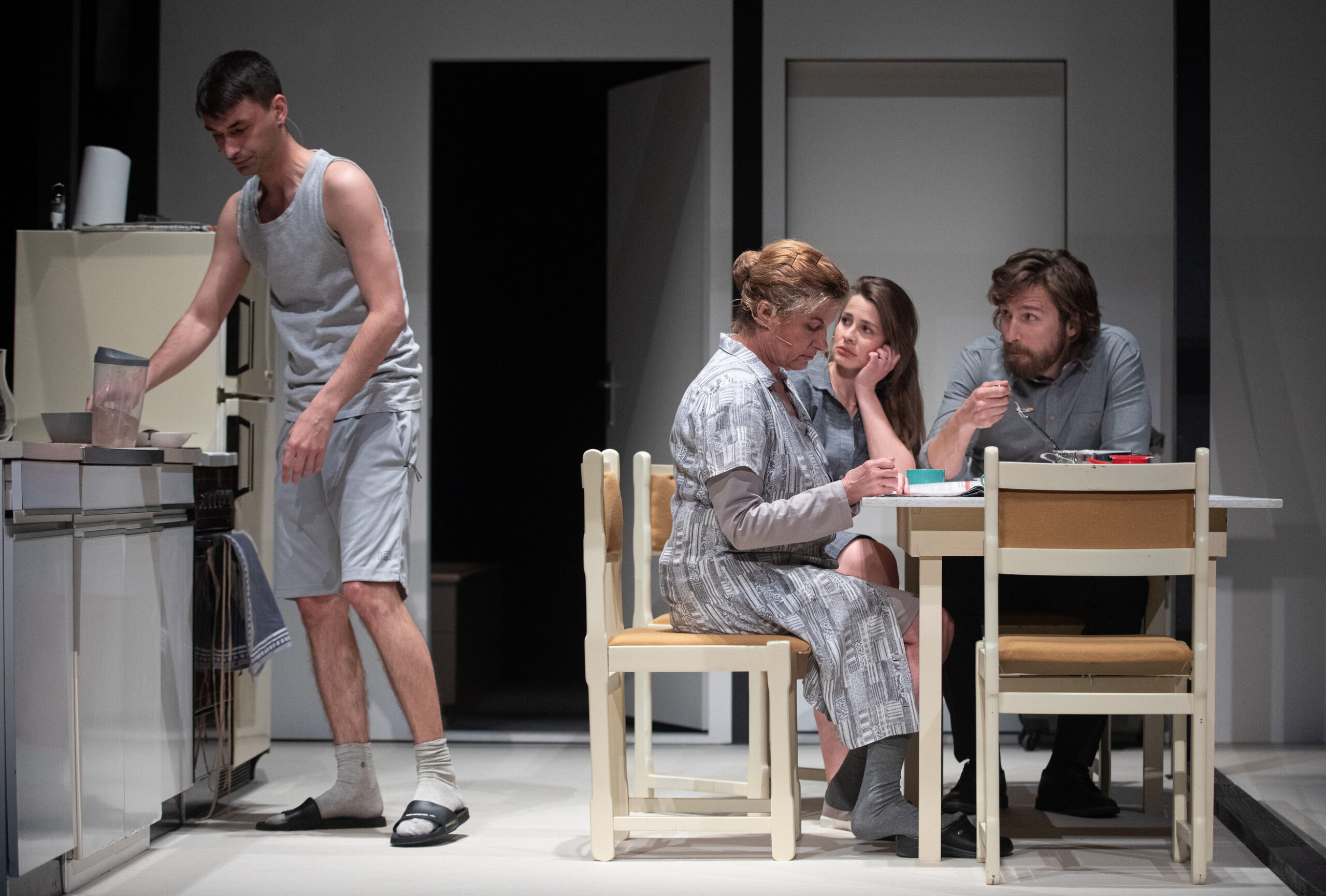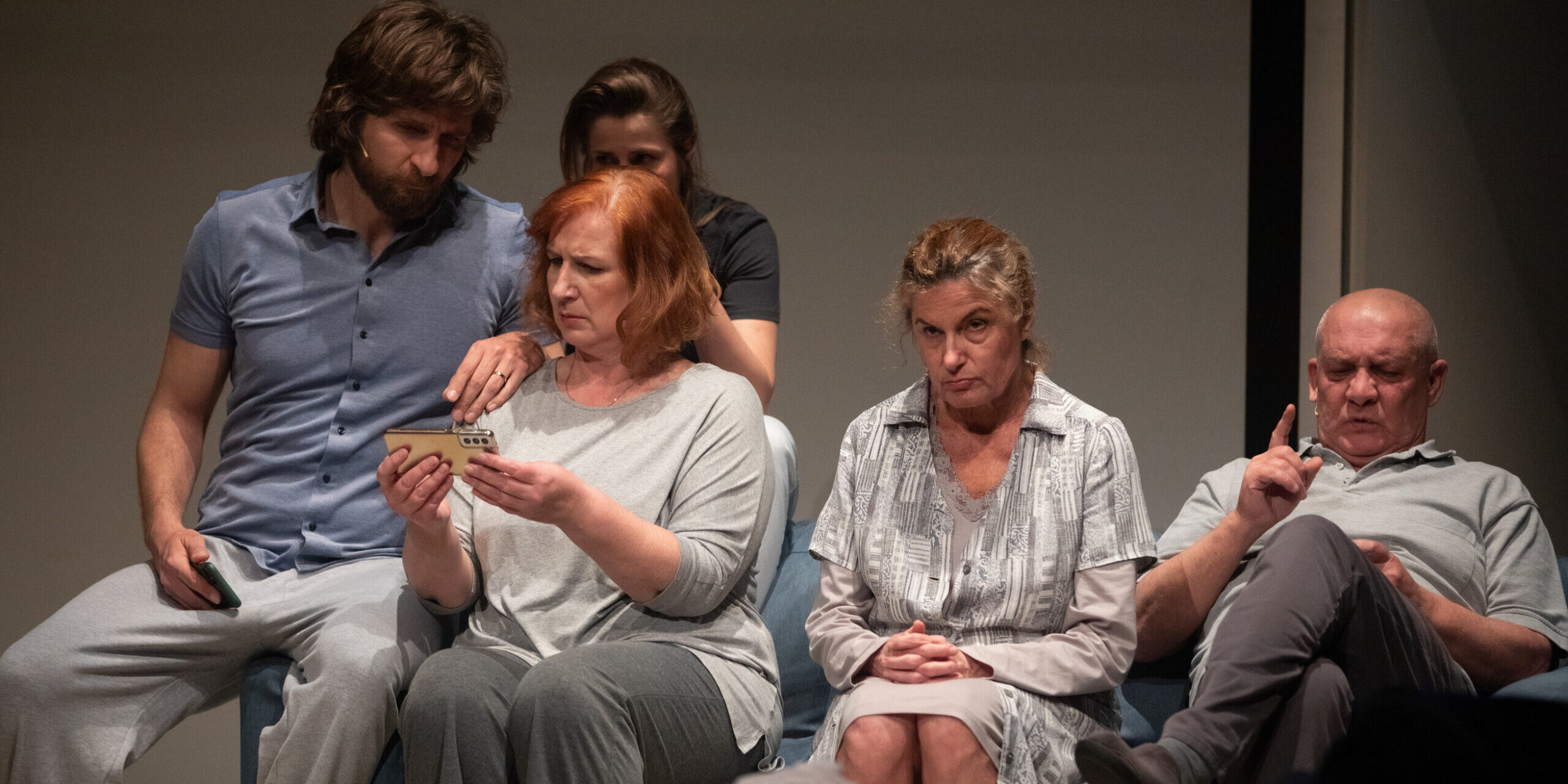Croatian National Theatre Split, premiere 26th March 2022
‘This is not their city anymore.‘
Day Zero. It’s Sunday, 1st May in Split. While some probably celebrate Labour Day, a young married couple, Lena (Ana Marija Veselčić) and Tino (Goran Marković) are forced to move out of their rental apartment to live with her family. Their landlord rents his property to tourists during the summer and he’s booked the entire season period.
This is a scenario all-too-familiar here, on the Croatian coast, which for years has belonged to anyone but the locals. The main profitable tourism strategy is squeezing every possible ‘kuna’ (or euro as of this year) out of tourists, which locals call ‘furešti’ (a term that comes from Italian, forestiere = stranger). Lena and Tino move into a 50-something square meter apartment, located close to the most famous beach in Split Baćvice, where four other people already live – Lena’s mother Nataša (Snježana Sinovčić Šiškov) and father Đuro (Nikola Ivošević), her younger brother Luka (Roko Sikavica) and her grandmother Fani (Arijana Čulina). As stated by the director Ivan Plazibat himself: when six people of four different generations live in a two-and-a-half bedroom apartment, there’s no need for aditional drama outside of the given situation.
Brilliantly written by Ivana Vuković, there’s no actual dramatic plot/twist or suspense in 55 Square Metres (55 Kvadrata), which was awarded two Croatian Actor Awards by the Croatian Association of Dramatic Artists (HDDU) last year; the Best Show in Drama category and the Best Female Supporting Role for Čulina’s performance. It consists of a series of scenes from working people’s everyday routines, which follow one after the other in a steady rhythm which fits the mundane reality in which every character finds themselves. They’re not tourists, so there’s nothing fun for them to do in the city. They can’t even eat out in the local restaurant Fife, as it’s all reserved for foreign guests. There’s no room for local residents in Split during the season, not even in their own homes.
This is demonstrated by the sleeping arrangement – the grandma sleeps in one room, the son sleeps on a mattress on his parents’ bedroom floor with them, while Lena and Tino are on the sofa bed in the living room. There’s also a problem with dirty, unsafe water and numerous fires that pollute the air, disasters which are all, unfortunately, inspired by real life events.
Besides the actors, there’s a cameraman (Andrija Jurčević) who follows the characters around the stage like a shadow. Above the scenography (by Tea Truta), which takes the form of an outline of the apartment stripped of the ‘fourth’ wall, there’s a screen where the live footage of the play is broadcast. This gives Big Brother vibes as it’s mostly used for the characters’ intimate monologues which are filled with personal confessions and private thoughts. The camera catches all the small glances and looks from the actors which the audience might usually miss or not pay attention to. Plus, it expands the performance space behind the walls and closed doors of the scenography into the backstage areas, even outside of the theatre, onto the street.
The actors are also wearing microphones which further indicates the artificiality of the play and makes it feel more like a reality show. Despite the microphones, some of the actors don’t articulate their lines well enough and it’s difficult to catch everything they are saying. The continuous soft light and colour changes (Srđan Barbarić) convey the sense of days passing, something which is also shown on screen, marking how many days have passed since Lena and Tino moved in.
55 Square Metres successfully depicts Split and its inhabitants (called ‘Splićani’) as they are, their mentality and spirit which is perfectly captured when an old classic song Ča smo na ovom svitu is played. Literally translated to ‘What are we in this world‘, the song is nostalgic, almost melancholic, for what city Split used to be and some better times. Splićani are known for great, biased love they feel for their city, so much they don’t want to move out of it, even if it means a better and happier life. This nostalgia is mostly expressed by grandma Fani who cannot adapt to the new lifestyle her family leads and just wants a piece of her own space which she hopes to find at the nursing home on whose list she thinks she is on. She doesn’t sleep at night and talks to her late husband Jakša about how everything has changed; that people live like ants, that lovers sleep with their backs turned to one another, not really looking at each other when they speak. She feels the younger generations are ungrateful for what they and she feels like she’s always in the way which makes her frustrated. Čulina’s performance as Fani is flawless, her acting in the role superb and she is well-deserving of her award.

55 kvadrata, HNK Split
Sikavica was also nominated for the Best Supporting Male Actor for the role of Luka. His performance is raw and eye-catching as a 17-year-old character, giving an exact portrayal of today’s youth in Split. Because tourism is the most lucrative business, many young adults drop out or don’t even go to university but rather do seasonal work in tourism instead. They have no motivation or perspective, the police often bully them, they spend their money on drugs and gambling. Sikavica delivers his lines vigorously, emphasizing the frustration and anger his character feels.
As time passes by, the tension among the tenants rise. This is best seen during scenes in the kitchen where conflict usually rises – hands are even thrown between brother and sister over the lack of morning cereals. Music is played over these dynamic ‘meal’ scenes, so the audience doesn’t actually know what the characters are talking about but we can guess it’s some typical small-talk. Both couples, Lena and Tino and Lena’s parents, are growing apart from each other. At one point, to get some piece and quiet, Tino reads a book on beloved Croatian writer from Split, Miljenko Smoje, in the bathtub. In their monologues, they express tenderness and love they feel for their spouse and how they wish to express the love they feel for them. There’s hostility in mother-daughter relationship, too. The mother expects Lena to help her with housework and when Lena suggest she asks help from the men in the apartment, her mother replies they can’t because they are men. This is typical for Dalmatian families where the women are expected to do all the house work and treated like maids.
Later in September, as the season nears its end, some time has passed since Lena and Tino moved out of the apartment (and perhaps left Split?). It seems like the balance is restored between the rest of the household, everyone seems calmer, even Fani who’s maybe still waiting for her son Joke to arrange her a place in the nursing home, or has come to terms with the situation. Or maybe everyone is just pleased they no longer have to crowd together for bathroom and everyone has a bit more space for themselves. It doesn’t feel like they live in a anthill anymore. At the end, Fani refers to Emanuel Vidović (1870 – 1953), Croatian painter from Split, whose paintings with time became more gloomy and darker, as he also witnessed his home town disappearing as he once knew it and loved.
Credits: Text/dramaturgy: Ivana Vuković //Director: Ivan Plazibat//Scenography: Tea Truta// Costume: Petra Pavičić
For further information, visit: hnk-split.hr
Further reading: Interview with Ivana Vuković: “I write about the things to which I don’t have the answers”
Nora Čulić Matošić (1998) is a student of Comparative Literature (MA) at the Faculty of Humanities and Social Sciences in Zagreb. She has written theatre criticism for the Croatian radio programme Theatralia and web portal Kulturpunkt.hr. Besides theatre, her interests are other forms of performing arts (particularly dance performances) and film.








